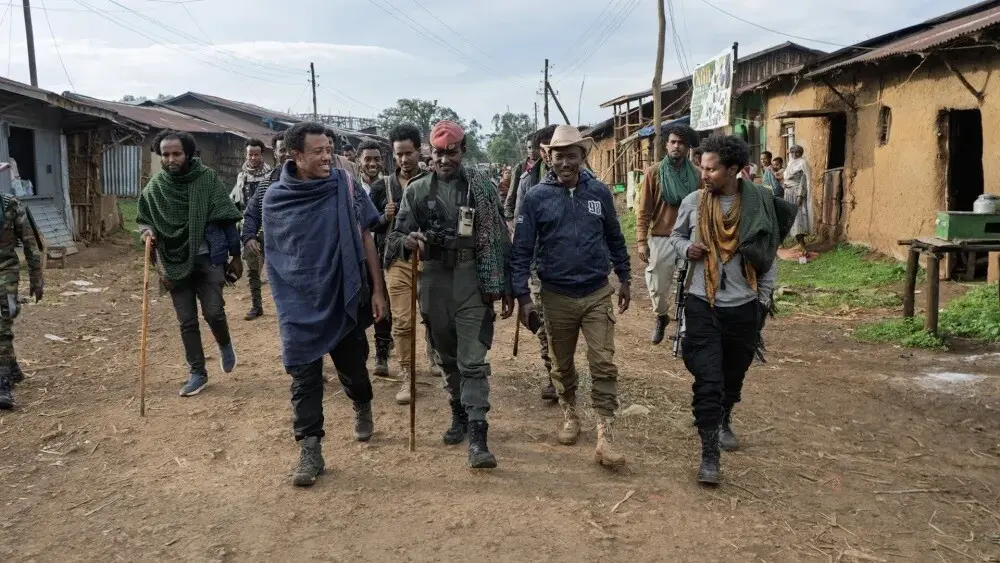Aklog Birara (Dr)
February 24, 2025
Amhara has been fighting against a cruel, barbaric, and tyrannical system in defense of its sheer survival for half a century and especially the past two years. Amhara continues to fight for sheer existence without external government support.
I recognize this fight for freedom from punishment by the state and government as remarkable, courageous, and just.
I cannot imagine Ethiopia without Amhara. Nor do I imagine Ethiopia without all ethnic groups sharing the same political, social, economic, and psychological space.
I recognize the fight for freedom, justice, genuine equality, the rule of law and democracy comes at a huge cost in human lives and in the economy. Freedom, they say, is not free.
If the cost is high, why not consider the most effective and efficient means to deal with the problem? Why not consider a permanent solution?
The tragedy I wish to point out is that mutual trust among Ethiopian elites is non-existent. It saddens me, the exceptions notwithstanding, most non-Amhara do not champion the Amhara cause.
People manifest this behavior of mistrust daily in social media, among political and social elites and even faiths.
I shall set aside the fractured and divided Ethiopian political and social elite for now. Today, the nationality group that faces an existential threat is Amhara. This commentary targets Amhara elites and people.
Amhara genocide is under-appreciated and under-reported by the international community: the UN, EU, AU, corporate media, and regional institutions. It is also unappreciated by a large segment of the Amhara elite.
So what?
When there is no trust, it is easy to become helpless and hopeless. When there is no trust among stakeholders, it is difficult if not impossible to agree on alternative models of future governance for Ethiopia.
Because of this, we enter a vicious cycle of suspecting, second guessing, gossiping, and accusing one another.
Qora defines trust in this way. “Trust must start before you ever enter a relationship. It must start the first time you meet. You must behave like a responsible and trustworthy adult. You must establish that your default setting is to be honest and forthright. No storytelling, no excuses, no “forgetting” you made an agreement, no “forgetting” your wallet.
Both parties need to take things slowly and not be afraid to call a halt if any red flags pop up. Then you need to proceed without constantly spying and checking up on the other person.”
In his acclaimed book, “The Five Dysfunctions of a Team,” author Patrick Lencioni tells us “Trust is the foundation of real teamwork.” Politics in defense of the Amhara cause is a team sport. So, stakeholders and leaders of the cause have an obligation to listen to and understand and trust one another.
My experience over the past decade is that we do not talk about the core principles and values that will make our cause successful.
- How often do we discuss trust at the start of the process?
- How often do we discuss and agree on a unity of purpose, goals, and results?
- How often do we discuss and agree on each person’s responsibility and accountability?
- How often do we discuss the modalities of conflict management and resolution among our own associations and groups?
- How much are we willing to critique ourselves instead of others?
- How much will we be willing and ready to change?
In my assessment, it is not too late to focus on and answer these core questions.
I share Lencioni’s conclusion the absence of trust emanates from “The unwillingness of members to be vulnerable. Team members who are not genuinely open with one another about their mistakes make it impossible to build a foundation for trust.
Amhara has tons of associations and organizations across the globe. Logically, this is a huge asset for the Amhara cause.
Yet, Amhara lacks a well-developed institutional framework that addresses the following:
- Preparation and consensus building on a coherent and compelling political roadmap that is binding.
- preparation and execution of strategic plans systematically.
- Development of robust public relations, public diplomacy. media and lobby platform across the globe and speaking from one script.
- Mobilization and effective use of funds in support of Amhara victims of war, mass destruction and atrocities in a transparent and accountable manner.
- Unification of Amhara groups in the Diaspora.
- Establishment of an all-inclusive Amhara Fano institution: political, military, and social and the rest with clearly defined tasks and responsibilities.
Managing a social and pollical movement can no longer be haphazard. It must be based on similar principles and values to run a corporation or a government. It requires teamwork, planning, managing, implementing, and evaluation.
In turn, this requires optimal use of professional and technical experts.
If Amhara activists believe the government and party of Ethiopia threatens Amhara existence; it behooves them/us all to make commitment to stop bickering among one another and deal with the atrocities and economic destruction. It is the system that matters most.
Regardless of region and locality, Amhara faces horrendous and multifaceted problems.
- Daily bombardment deploying drones killing innocent civilians, destroying economic and social infrastructure.
- Arbitrary arrests
- State sponsored starvation.
- Double digit unemployment among youth.
- School closures that affect future generations.
- Massive internal displacement.
The assault on Amhara is deliberate, systemic, and multifaceted.
As millions of Ethiopians who belong to the Ethiopian Orthodox Tewahedo Church begin the 55-days fasting season today; I urge them/us to take time and reflect on why we must trust one another and why we must collaborate with one another and save ourselves.
I say this because the assaults on Amhara may be irreversible.
My plea to Amhara stakeholders, especially youth, and elites is to focus on trust, the bigger picture of unity of purpose and achieving results.
The potential among Amhara is huge. Let us capitalize on this potential soonest.

